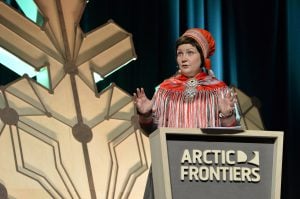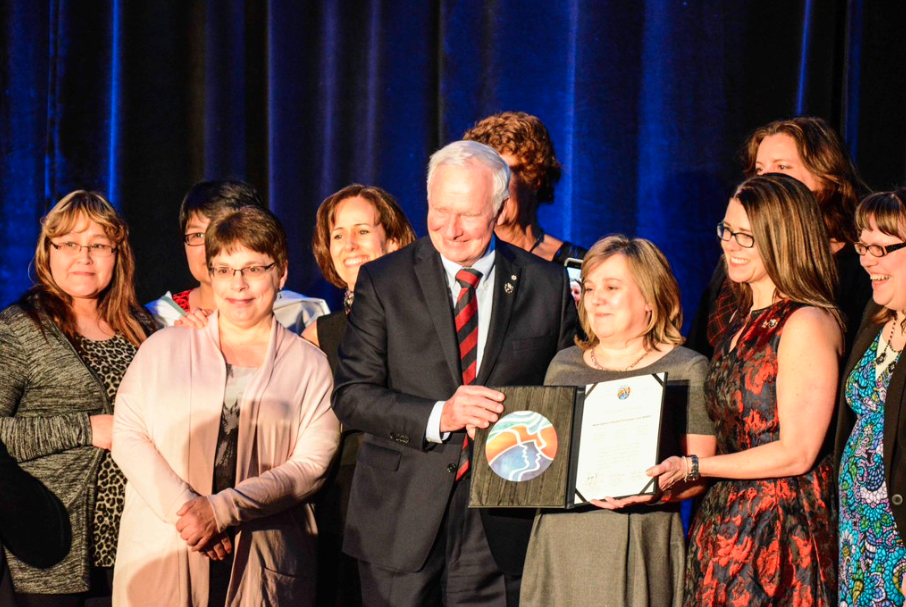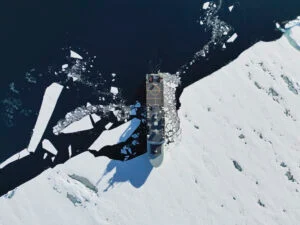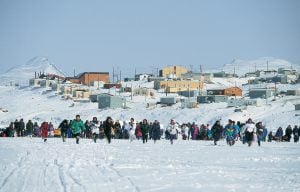
Environment
Five key takeaways from the Arctic Frontiers conference
The uncertainty and change that's currently disrupting the region dominated the annual meeting's agenda
- 2651 words
- 11 minutes
This article is over 5 years old and may contain outdated information.
People & Culture

Three programs dedicated to advancing the quality of life in Canada’s northern communities received a much-needed funding boost on January 27 through the annual Arctic Inspiration Prize.
This year’s laureates — Better Hearing in Education for Northern Youth (BHENY); Qaggiq: Nurturing the Arctic Performing Arts; and the Tri-Territorial Recreation Training — each received a portion of the $1.5 million prize, which was bumped up from the usual $1 million thanks to extra partner support.
On hand to present the awards in Ottawa was His Excellency the Right Honourable David Johnston, Governor General of Canada, who expressed his admiration for all the 2015 laureates.
“The future of Canada’s north is in good hands” – @GGDavidJohnston on the #AIP2015 finalists
— Sabrina Doyle (@sab_jad) January 28, 2016
Better Hearing in Education for Northern Youth (BHENY) was awarded $300,000 for its plan to foster literacy and academic outcomes for youth living with hearing loss in the Qikiqtani Region of Nunavut.
“It is much more difficult to learn when you cannot hear,” said Lynne McCurdy, an audiologist from Guelph, Ontario. The BHENY project will include classroom-based sound amplification technology, professional development, training and support for educators, parents and the community.
Qaggiq: Nurturing the Arctic Performing Arts was awarded $600,000 to implement its plan to revitalize Arctic culture and the performing arts.
“The Arctic Inspiration Prize arrives at a time when Arctic performing arts are at risk of being lost or never realized,” said team leader Ellen Hamilton of the Qaggiavuut Society in Iqaluit, Nunavut. The Qaggiq team’s strategy includes artist mapping, artist and teacher training, collaborative performance, mentorship and youth programming.
Yupppppeeeee! The Qaggiq project and @Qaggiavuut is by the people for the people. Thank you for the incredible support. Pilluarta!!!!!!!
— Laakkuluk W. Bathory (@Laakkuluk) January 28, 2016
The Tri-Territorial Recreation Training (TRT) Project received $600,000 for its plan to develop recreation leadership training programs in rural and remote communities across Canada’s three territories.
“Recreation has the power to improve community health, wellbeing and quality of life,” said team leader Anne Morgan from the Recreation and Parks Association of the Yukon.
Thank you @ArcticPrize for this amazing opportunity with our team @nwtrpa and RPAN #AIP2015. pic.twitter.com/zezBx3BECa
— RPAY (@RPAY1) January 28, 2016
The Arctic Inspiration Prize family is growing! Congratulations #AIP2015 laureates @RPAY1 @hearwell1 @Qaggiavuut! pic.twitter.com/VHfZjA4pNt
— Arctic Inspiration (@ArcticPrize) January 28, 2016
Are you passionate about Canadian geography?
You can support Canadian Geographic in 3 ways:

Environment
The uncertainty and change that's currently disrupting the region dominated the annual meeting's agenda

People & Culture
As the climate heats up, so do talks over land ownership in the Arctic. What does Canadian Arctic Sovereignty look like as the ice melts?

People & Culture
The story of how a critically endangered Indigenous language can be saved

History
On April 1, 1999, Canada’s youngest population took control of its largest territory. Here’s how Canadian Geographic covered the story.